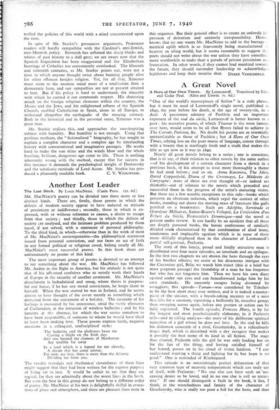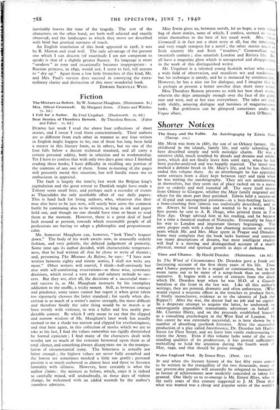A Great Novel
" ONE of the world's masterpieces of fiction " is a stale phrase, but it must be used of Lermontoff's single novel, published in 1840, the year before his death, at the age of twenty-six, in a duel. A passionate admirer of Pushkin and an important exponent of the mal du slick, Lermontoff is better known as a poet : his narrative poems, of which Thamar is the most famous over here, would seem to be all that Byron failed to achieve in The Corsair, Parisina, &c. No doubt his poems are as essentially untranslatable as those of Pushkin ; but A Hero of Our Own Times, relying less on the pure music of language, comes through with a beauty that is startlingly fresh and a truth that makes the title as apt now as it was in 1840.
Nearly all great novels belong to a series ; one is conscious, that is to say, of their relation to other novels by the same author —of his development of a certain character from a sketch in a previous book, of his attempt to treat more thoroughly a theme he had used before ; and so on. Anna Karenina, The Idiot, David Copperfield, Diana of the Crossways, Le Midecin de Campagne: none of these are ever thought of—or indeed are thinkable—out of relation to the novels which preceded and succeeded them in the progress of the artist's maturing vision. But there are a few notable exceptions to this rule—books which preserve an obstinate isolation, which repel the contact of other books, standing out above the moving mass of literature like gulls perched on a breakwater. Such are Adolphe, Servitude et Grandeur Militaires, Sainte-Beuve's Volupte, La Confession d'un Enfant du Siecle, Fromentin's Dominique—and the novel at present under review. It can hardly be an accident that all these are deeply personal books, the heroic confessions of similarly divided souls characterised by that combination of aloof irony, tenderness and implacable egotism which is in none of them more skilfully displayed than in the character of Lermontoff's partial self-portrait, Pechorin.
The story of this lonely, proud and fatally attractive man is distributed over four main episodes, an interlude and an epilogue. In the first two chapters we are shown the hero through the eyes of his brother officers; we assist at his disastrous intrigue with the Circassian girl, Bela; we watch him reject (this is a brief but most poignant passage) the friendship of a man he has forgotten but who has not forgotten him. Then we have his own diary opened under our eyes and can henceforward judge him by his own standards. He narrowly escapes being drowned by smugglers; this episode—Taman—was considered by Tchebov to be the best short story ever written, and it is indeed a master- piece of the sinister, with a breath-taking mystery as of a mist that lifts for a moment, vignetting a brilliantly lit, macabre group, then sweeping across again, before any gesture or action can be fully expiained. The fourth episode, Princess Mary, is by far the longest and most psychologically elaborate; in it Pechorin tells—and in telling analyses—the story-of his deliberate spiritual seduction of a girl whom he does not love. In the end he kills his dishonest coxcomb of a rival, Grushnitsky, in a ridiculously tragic duel, which is described with a dry savagery that makes it possibly the best scene of its kind in all fiction. The stage thus cleared, Pechorin tells the girl he was only leading her on for the fun of the thing, and having satisfied himself of her hatred, passes on in his cloud of ironic fatalism. " I can understand wanting a thing and fighting for it; but hope is no good." One is reminded of Kierkegaard.
This episode is an astonishingly perfect delineation of that very common type of neurotic temperament which can truly say of itself, with Pechorin: " No one else can have such an 'un- ceasing desire to be loved, and in no one else is evil so attrac- tive." If one should distinguish a fault in the book, it lies, I think, in the wretchedness and fatuity of the character of Grushnitsky, who is really too poor a foil for the hero, and thus
inevitably lowers the tone of the tragedy. The rest of the characters, on the other hand, are both well selected and exactly observed; and the landscapes in which they move are described with brief but poetical sureness of touch.
An English translation of this book appeared in 1928; it was by R. Merton and read well. The only advantage of the present one which I can discern (of exactitude I am not competent to speak) is that of a slightly greater fluency. Its language is more " modern " in tone and occasionally becomes inappropriate : a Russian princess, in 184o, would not, I seem to feel, tell anyone to " dry up." Apart from a few little blemishes of this kind, Mr. and Mrs. Paul's version does succeed in conveying the extra-. ordinary clarity and distinction of this most wonderful book.
EDWARD SACKVILLE WEST.



































 Previous page
Previous page